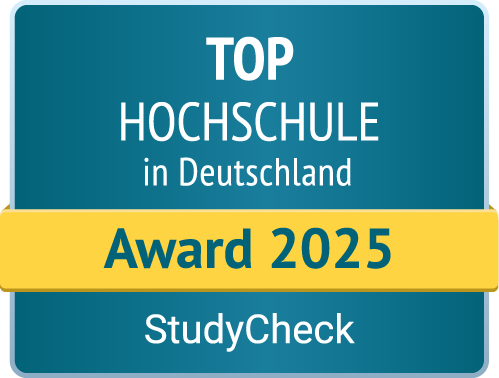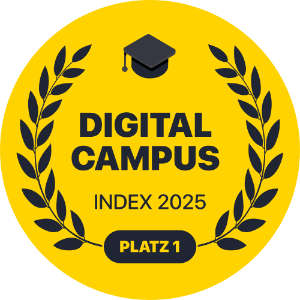Discover plastics as a sustainable material of the future
Plastics Engineering
Study Overview
As an application engineer in plastics technology (KT), you will work with innovative materials for use in lightweight construction, e.g. for energy-saving vehicles or housing applications, e.g. for communication electronics or hygienic packaging concepts in the food and pharmaceutical sectors. Polymer materials from fossil or renewable raw materials and their processing into products continue to find increasing importance in almost all areas. They develop digital models for optimal processing with modern machines, e.g. for injection molding. The environmentally friendly recycling of plastics is also playing an increasingly important role.
Short profile
The Plastics Technology (KT) course is an offering from the AIW programme. In the first two semesters, students complete the basic studies together. The specialization in KT takes place at the beginning of the third semester. After seven semesters of standard period of study, you will graduate with a Bachelor of Engineering degree.
Mobility and lightweight construction
Mobility and lightweight construction
"Whether on the road, in the air or at sea, modern plastic-based materials are increasingly helping to save energy and thus reduce CO2 emissions."
Material with a future
Material with a future
"The increased use of modern plastics includes innovative manufacturing concepts, a wide range of applications and efficient recycling."
Communication Electronics
Communication Electronics
"Modern plastics technology forms the basis of digital system networking and communication technologies."
Study Structure
Study Contents KT
In the course of your major studies in plastics engineering, you will learn about the manufacturing processes and technologies for plastics processing. Material-specific issues concerning polymers and their production also play an important role. Modern elements in plastics processing, such as simulation, surface engineering, and prototyping, are explored in depth in appropriate modules. The contents of most modules are clarified in accompanying practical courses in state-of-the-art laboratories. Organizational aspects are also the subject of your training. For example, you will learn about the importance of project management and quality management for the successful application of plastics technology in special modules.
Are you interested? Then apply here for our Applied Engineering degree programme (AIW).
During the online application, you can already specify a desired field of study - don't worry, your choice isn’t definitive. You will make your final decision for the area of study at the end of the second semester. Thus, the first two semesters offer you enough time to get oriented as well as to discover the fields of study that are interesting for you.
The application period is from May 2nd to September 30th. The studies start in the winter semester on October 1st.
If you have any questions, please contact the Student Services.
studierendenservice.aiw(at)hs-ansbach.de
Notes for Transfer Students
Transfer students can enter a higher subject semester. This is possible for the winter semester as well as for the summer semester. Previous achievements that have a subject related equivalent in the Applied Engineering Science Programme can be recognized. To do so, compare the module handbook of your previous degree programme with that of the Applied Engineering Sciences Programme. If you have subjects from higher semesters recognized, you will determine your field of study at the same time. Invest the time to read the module manuals, because it is your achievements that you can have recognized for your new degree programme! Please note the general information for transfer students.
Continuing with graduate studies
Ansbach University of Applied Sciences offers you various master's degree programmes that you can take following your bachelor's degree.
Further Information
The diversity of the degree programme is reflected in the career prospects. Employers particularly appreciate the broad basic knowledge and practical skills of our graduates. Combined with the specialization in the main course of study, many occupational fields open up in the engineering sector.
Occupational Fields
The study of applied engineering optimally prepares you for your professional life. Depending on the orientation of your studies, you can work in a variety of companies and research institutions in a wide range of industries. Thus, you will find your challenges in the following industries:
- Plant and Mechanical Engineering
- Automation and Electrical Industry
- Consulting
- Energy Supply Companies
- Engineering Offices
- Chemical and Industrial Production Plants
- Public Utilities
- Technical services in public authorities, in companies in the biotechnology and environmental technology sectors and in information and communication technology
At the Technology Center for SMEs at Ansbach University of Applied Sciences (TZM), the Surface Technology department focuses on innovative concepts for plastic surfaces. Plasma technology is used to functionalize and modify surfaces, e.g. with the aim of easy cleaning (lotus effect).
Teaching and applied research are networked at the kunststoffcampus bayern in Weißenburg. Modern plastics technology machines and processes are available for university and industrial projects.
At the Biomass Institute of Ansbach University of Applied Sciences, research is underway into the sustainable use of plastic waste in new applications with wood waste for building insulation. In another project, research is being carried out on the subject of plastic waste.
In many large corporations, English is the official business language. Smaller companies are also often intensively networked with partners from all over the world. It is therefore not surprising that experience abroad is highly valued by many employers. Furthermore, students confirm that international encounters are an enriching personal experience.

Semester abroad
When planning and carrying out a semester abroad, you will receive individual support from our International Office – both organizationally and, in many cases, financially. To make the start easier, you can prepare your stay abroad in our Language Centre.

Ansbach International Summer School
International encounters are also possible on the Ansbach campus. Students from all continents travel to the Ansbach International Summerschool. German-international teams work together in various specialist workshops. In addition to the technical learning content and the intercultural training, encounters and fun are not neglected. The relevant Summer School workshops are credited as a general science elective module in the AIW degree programme.

Jessica Ellinger
Application development of bioplastics
"Right from the start, I was assigned tasks that I could work on independently. It was a good feeling to be fully part of the team even as an intern and to be able to contribute something valuable ..."
© 2025 Hochschule Ansbach








